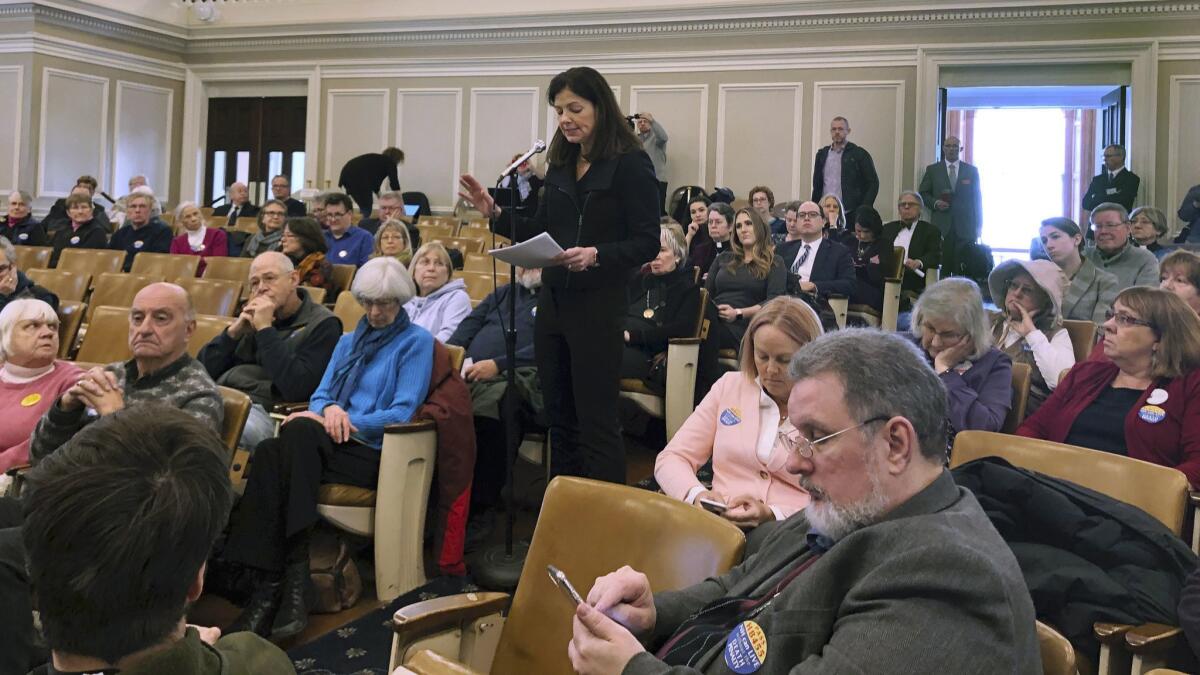Opinion: New Hampshire is about to end the death penalty in the ‘Live Free or Die’ state

The New Hampshire state Senate voted Thursday to end the death penalty in the “Live Free or Die” state, following a similar vote in the state House of Representatives last month. Margins in both houses were large enough to overcome a veto should Gov. Chris Sununu try to block the measure, as is expected. Last year, he vetoed a similar measure, which the Legislature failed to override.
So it’s all over but the shouting, at least in New Hampshire.
California, of course, still has the death penalty, though Gov. Gavin Newsom recently announced a moratorium for as long as he’s in office — a significant though symbolic gesture, at least for now, given that the federal courts have shut down the execution chamber at San Quentin over legal issues with the state’s lethal-injection protocol. Newsom also withdrew the state’s proposed single-drug execution protocol, which adds yet another delay in the eventual resumption of capital punishment here.
Interestingly, conservatives across the country have begun to tip the balance on the death penalty and other efforts at criminal justice reform. A traditionally reflexive, hard-line law-and-order ethos has thawed for many, leading to sentencing reforms for lower-level crimes as well as efforts to end capital punishment on grounds, in essence, that it is expensive and likely to lead to the executions of some innocent people.
So it’s all over but the shouting, at least in New Hampshire.
In fact, the New Hampshire vote, should it end where it seems to be headed in a ban on the death penalty, marks the third time in recent months in which capital punishment has run into a state wall. In addition to Newsom’s moratorium, the Washington Supreme Court declared last year that state’s death penalty was unconstitutional because it is “racially biased.” That followed a 2014 moratorium by Democratic Gov. Jay Inslee.
In New Hampshire, the Legislature’s move puts into law what had already been the practice. The state has only one person on its death row, and it has not managed to execute anyone since 1939.
According to the Death Penalty Information Center, New Hampshire would be the 22nd state to formally end the death penalty. Including states that have a death penalty that hasn’t been used in more than a decade, we’re at 31 states.
Meanwhile, about 45% of Americans say they believe that the death penalty is imposed unfairly, according to a Gallup poll from October, which Gallup said was an increase from previous surveys. Those who said they thought it was applied fairly dipped to 49%, the lowest level Gallup has recorded since 2000.
Enter the Fray: First takes on the news of the minute »
As a matter of policy, support for capital punishment is 54% nationally, which the Pew Research Center says is near historic lows (Gallup has it at 56%, near historic lows for its polling as well).
In California, a recent Quinnipiac poll found that support for the death penalty had dropped to 41%, compared with 48% supporting a maximum penalty of life in prison without parole. That implies a seismic shift from 2016, when voters rejected a ballot measure to end the death penalty and voted instead for a regimen that would speed it up. (The courts have rejected key portions of the latter measure.)
As the Times editorial board wrote last month, Newsom’s moratorium could prove to be a significant force in ending capital punishment in the state as a proposed 2020 ballot measure works it way through the Legislature.
“Meanwhile, the will of the people has been shifting,” the board wrote. “Last year, California juries imposed only five death sentences, down from 11 the year before and from a peak of 43 death sentences in 1999. As more capital punishment cases get deeper reviews by opponents of capital punishment, more and more people — 164 since 1973 — are being exonerated and released from death rows nationwide, including five in California. Newsom already had expanded DNA testing in the highly questionable 1985 conviction of Kevin Cooper that could lead to a sixth exoneration. And about half of the exonerated nationwide are African American, evidence that the system disproportionally affects minorities.”
Since that editorial appeared on March 13, a mere month ago, another death row exoneration was added to the list — Clifford Williams Jr., after spending 42 years in Florida prisons.
So there does seem to be a slow but significant shift away from capital punishment, a shift that has been too long in the coming. Among the leading nations of the world, we are among the last to abandon such barbaric acts by the government. Let’s hope we join the world of the just and sane sooner rather than later.
UPDATES:
8:24: This post was updated to correct the year of New Hampshire’s last execution.
More to Read
A cure for the common opinion
Get thought-provoking perspectives with our weekly newsletter.
You may occasionally receive promotional content from the Los Angeles Times.







